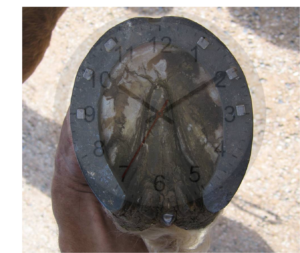Time Efficiency

Farriers should have the clock in mind when shoeing horses. Setting goals helps us to use our time efficiently.
How long should it take to trim a horse? How about to shoe a horse? To be a good farrier, do you have to be fast? These questions are frequently asked by those who are just starting out. Aspiring farriers can become discouraged because it seems to take a long time to do a quality job. Rather than improving their time management, some farriers unfortunately try to justify their slow work by saying that they are going slow in order to do a better job. They claim that if they are to do a good job, they can’t be rushed, as if speed and quality were mutually exclusive. Quality should not be sacrificed at the expense of speed, and it doesn’t have to be. A professional farrier puts in the time and effort in order to produce quality work at speed (or at least in a reasonable amount of time).
I once overheard a starting farrier say, “My clients will appreciate that I take my time to do a good job.” Translation: “I hope my clients won’t care that I’m slow.” It’s true that clients appreciate quality work, but they also appreciate being able to do something else with their day, besides watching the farrier fumble around the horse. Most clients won’t tolerate a farrier taking 4 hours (or more) to shoe one horse when they could have another competent farrier do the same job (or better) in 1 hour. Most farriers will start out slow, but they should be setting goals to speed up and become more efficient.
Farriery is physically taxing. Farriers use lower back, leg and arm muscles just to hold the horse in a position where it is comfortable. Then they begin to work. The strength needed to do the job can be developed fairly quickly and after the right conditioning this shouldn’t be used as an excuse for working slowly. In fact, because it is so physically difficult, it is a good incentive to work faster! The longer you take, the more you hurt!
A major time consumer for most farriers has more to do with mental acuity rather than physical shape. If a farrier knows what he or she is doing, the job will go faster. Guesswork takes time. Farriers must know how to effectively shape the shoes. Many farriers lose time by walking to the horse from the anvil over and over again to check small increments of their work. Instead they should try to shape the shoe to the whole foot in one trip. Not knowing how to shape a shoe or how the anvil works might cause farriers to “hit and hope” rather than effectively using their tools. Learning and applying the mechanics of the anvil will shave a surprising amount of time off of the overall job.
In this job, the more efficient that you become, the more money you can potentially make. This is great incentive to speed up! When I was in college, I worked in a factory building tables. I was actually reprimanded by the floor boss for going too fast because by his estimation if we went slower we would not get all the work done and then we would have to come in on Saturday and get paid overtime. I didn’t want to come in on Saturday. I had horses to shoe that day! We would actually get paid more for doing less over a longer period of time. This was exactly opposite of what I was trying to achieve as a horseshoer. If I sped up on that job, I could get paid more and go home earlier!
There are many reasons to speed up our work as farriers. Horsemanship is a big factor. When it takes a long time to shoe a horse, the horse usually loses its patience. Even the best horse in the world will become irritated and start acting up if it has to stand for several hours in order to be trimmed or shod. Horses will appreciate a farrier that gets the job done in a timely manner. They will stand for the job better and that makes the job easier.
As farriers, we need to be honest with ourselves. Are we working at our maximum potential? Could we be more efficient? These are questions we should be asking. Many of us don’t get any better or faster because we don’t challenge ourselves. Recognizing where we are losing time and setting goals to improve will make us better professionals. If we make an effort to improve, we will make more money.
Related Posts
-
How long should it take to trim a horse? How about to shoe a...Feb 08, 2018 / 0 comments
-
To be successful, you have to do the right things. Educat...Jan 16, 2020 / 0 comments
-
One of the most rewarding benefits to me in conducting closi...Aug 03, 2011 / 0 comments
Blog Categories
- Anatomy
- Best Business Practices
- Conformation
- Current Events
- Customer Service
- Draft Horse Shoeing
- Equine Soundness
- Essential Anatomy Kit
- Farrier Careers
- Farrier training
- Foal soundness
- Horse Care
- Horse Foot Care
- Horse Owner Tips
- Horsemanship
- Horseshoeing
- Horseshoeing History
- Iron and Forge Work
- Student Spotlight
- Uncategorized
- Veterinary Care
Blog Archives
Contact Us
Butler Professional Horseshoeing School
495 Table Road
Crawford, NE 69339
(800) 728-3826
jacob@dougbutler.com
Subscribe to Our Blog
Get Our Free e-Book!
If you think you want to become a farrier (or know someone who does), this book can help you make that decision. Horse owners will learn the importance of choosing a qualified farrier and how to select the “right” one.
[ Get the e-Book Now! ]
- Follow:
